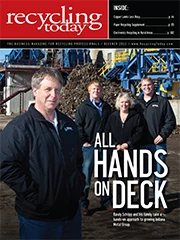|
|
A proposed ban on all disposable plastic bottles on the campus of a Canadian university has grown out of the student union’s campaign to ban bottled water at the school. The student union at Thompson Rivers University, Kamloops, British Columbia, has collected more than 2,500 signatures in support of its proposed ban on drinks in plastic bottles as of mid-November, according to an article in the Kamloops Daily News. The group’s sustainability crew is scheduled to go before Thompson Rivers University board of governors in December, at which time the organizers of the ban say they hope to have 4,700 signatures. “Everyone’s still going to be able to buy their beverage of choice, just in more sustainable containers, things like aluminum cans, glass bottles, fountain drinks from dispensers,” Dylan Robinson, a member of the student union, told the Kamloops Daily News. Of course, whether all of these options are truly more sustainable is up for debate. While few people would argue with the sustainable nature of aluminum cans, glass recycling is not without its challenges. And what kind of cups will those fountain drinks be poured into? The ban also does not take into account advancements such as Coca-Cola’s PlantBottle, which the Institute of Scrap Recycling Industries Inc. (ISRI) recognized in 2010 with its Design for Recycling Award. The PlantBottle is a PET (polyethylene terephthalate) bottle made through a process that turns sugar cane and molasses into a key component for PET plastic that is fully recyclable back into food-grade containers, according to Coca-Cola. When it comes to sustainabilty, the best choice is not always the clear choice, and bans have the potential to create unintended consequences.
In Recycling Today’s list and map of certified electronics recyclers (“Status: Certified,” p. 55) in the September issue, Affinity Information Management, Toledo, Ohio, should have been included as an R2 (Responsible Recycling Practices) certified company. We apologize for the oversight. |

Explore the December 2012 Issue
Check out more from this issue and find your next story to read.
Latest from Recycling Today
- AF&PA report shows decrease in packaging paper shipments
- GreenMantra names new CEO
- Agilyx says Styrenyx technology reduces carbon footprint in styrene production
- SABIC’s Trucircle PE used for greenhouse roofing
- Hydro to add wire rod casthouse in Norway
- Hindalco to invest in copper, aluminum business in India
- Recycled steel price crosses $500 per ton threshold
- Smithers report looks at PCR plastic’s near-term prospects






